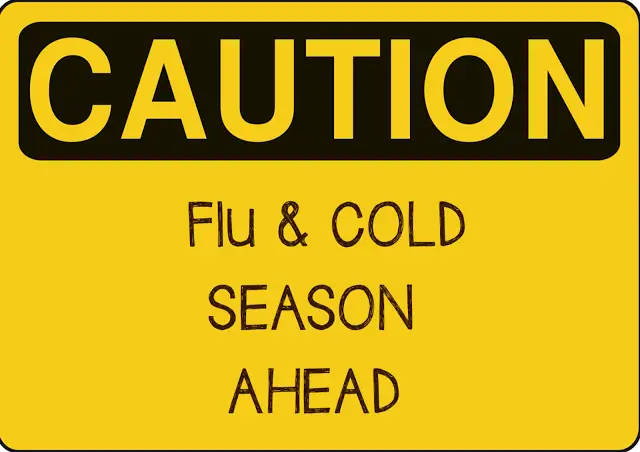Tips to Stay Healthy During Flu Season
Tips To Stay Healthy During Cold And Flu Season

Soruce: everythingmeandnyc.com
- Eat a diet rich in vitamins C and E. Foods containing these vitamins are helpful in supporting the immune system. Get your daily vitamin C from foods like orange juice, citrus fruits, broccoli and green peppers; foods rich in vitamin E include sunflower and corn oils, sunflower seeds and nuts such as almonds and peanuts. Also, make an effort to reduce your intake of concentrated sugar (e.g. soda, candy) because excessive sugar impairs the immune response.
- Get a good night’s sleep. Sleep is the critical period when your body rests and rejuvenates. Lack of Zs may profoundly inhibit your immune system, so get a full night’s rest to keep your body’s natural defenses working at top efficiency to ward off the flu.
- Stay hydrated. Increasing your water intake will help you stay healthy and lessen your chance of coming down with the flu. When you’re feeling under the weather, drinking extra fluids prevents dehydration caused by fever, loosens mucus and keeps your throat moist. Warm liquids are preferable, and there is some evidence that inhaling steam early in the course of a cold or flu may reduce the spread of viruses in your upper respiratory tract.
- Get vaccinated: Getting the annual flu shot at the beginning of the flu season can help to build your immunity against the major flu strains. These vaccines are made up of weakened or killed organisms that cause major strains of the flu. When they are injected, your body reacts to them and develops antibodies. You will not get flu from these vaccines but when the active forms of these viruses try to enter during flu season, your body already has the antibodies required to fight them off, so you won’t get sick. Learn more about flu, the flu vaccine and staying healthy at MyMed.com.
The flu vaccine is just one way to help prevent the spread of the influenza virus, but there are many other steps you can take to stay healthy during cold and flu season. Prevention is key, and simple habits like washing your hands frequently with soap and water or using an alcohol-based hand sanitizer, covering your mouth and nose when you cough or sneeze, and staying home when you’re feeling sick can all help protect against the flu and other infectious diseases. Due to the COVID-19 pandemic, it’s more important than ever to take precautions to avoid close contact with people who are sick and to manage your stress to strengthen your ability to fight off viral infections. We’ll explore the best defense against the common cold and flu, including tips for staying healthy, how to manage flu symptoms, and when to seek urgent care.
What Causes Colds & The Flu?
Colds and the flu are both caused by viruses, such as the flu virus. They spread easily through droplets when an infected person coughs or sneezes, and can also be contracted by touching a contaminated surface and then touching your nose, mouth or eyes. To stay healthy during cold and flu season, it’s important to practice healthy habits such as washing your hands frequently, wiping down surfaces with disinfectant, and staying home from work or school when you’re sick. The Centers for Disease Control (CDC) recommends getting vaccinated, drinking plenty of fluids, eating nutritious foods, and getting enough sleep to help prevent respiratory illnesses. Health experts also advise using an alcohol-based hand rub and lathering your hands for at least 20 seconds, as well as covering your mouth when you cough or sneeze to prevent airborne germs from spreading.
How To Recognize The Signs And Symptoms Of Cold And Flu
Recognizing the signs and symptoms of cold and flu is crucial for prompt treatment. Cold symptoms include a runny or stuffy nose, sore throat, cough, congestion, and mild body aches. Flu symptoms are similar but more severe, with added fever, chills, and fatigue. To stay healthy and avoid contracting these illnesses, it’s important to practice preventive measures such as washing your hands frequently, disinfecting surfaces, and staying physically active. If you do catch a cold or the flu, getting plenty of rest, drinking fluids, and taking zinc and vitamin C supplements may be helpful. Health experts recommend getting at least eight hours of sleep each night and seeing a healthcare provider if symptoms persist or worsen.
How To Prevent The Spread Of Illness
Preventing the spread of illness is crucial to staying healthy, especially during flu season. One effective way to prevent the spread of germs is by washing your hands frequently with soap and warm water. Cover your mouth and nose with a tissue or your elbow when coughing or sneezing, and dispose of used tissues promptly. Wipe down surfaces regularly with disinfectant, especially frequently touched objects like doorknobs. If you are sick, stay home from work or school to avoid spreading illness to others. Experts say that these simple measures, along with staying physically active and maintaining a healthy diet, can help prevent the spread of illness and keep you healthy all year long.
Protecting Your Respiratory Health: How To Avoid Catching A Cold Or Flu
Protecting your respiratory health is crucial in avoiding the cold and flu. There are several ways to do this, including washing your hands regularly, avoiding close contact with sick individuals, and covering your nose and mouth when you cough or sneeze. It’s also important to avoid touching your face, especially your mouth and nose, as this can increase your risk of infection. Additionally, keeping your living spaces clean and disinfected, getting plenty of rest, and staying physically active can help strengthen your immune system and lower your risk of catching a cold or flu.
Flu At Work: Tips For Staying Healthy In The Workplace
Influenza can easily spread in the workplace, causing lost productivity and potential illness. It’s important to take steps to prevent the spread of the flu at work, such as regularly washing your hands with soap and water, avoiding touching your face, covering your mouth and nose when coughing or sneezing with a tissue or your elbow, and disinfecting commonly touched surfaces like doorknobs and phones. It may also be helpful to encourage sick coworkers to stay home and to get vaccinated against the flu. By practicing these healthy habits and taking preventive measures, you can help protect yourself and your coworkers from the flu virus.
Conclusion
In conclusion, there are several ways to stay healthy and prevent the spread of seasonal flu and other illnesses. Hand washing is one of the most effective preventive measures, and it is important to wash your hands regularly and thoroughly with soap and water. Additionally, it is recommended to keep your hands away from your face, avoid close contact with people who are sick, and get vaccinated every year. By taking these simple steps, you can help protect yourself and those around you from getting sick. It’s also important to consult a healthcare provider if you experience flu-like symptoms, especially if you are in a high-risk group such as young children, elderly, or people with underlying health conditions. Stay healthy and take care of yourself!
Frequently Asked Questions (FAQs)
If you’ve still got questions about Ways to stay healthy during cold and flu season, then these may help:
How Do You Avoid Getting Sick When You Feel It Coming?
There are several practices one can follow to avoid getting sick when they feel it coming. First, it’s essential to use a clean towel to avoid spreading germs from one person to another. Additionally, staying hydrated, getting enough rest, and eating a balanced diet can help boost the immune system. It’s also vital to stay away from crowded places, especially during flu season. Studies show that Omaha is among the US cities that have high flu activity, so it’s crucial to take extra precautions if one is in the area. If one is feeling sick, it’s important to rest at home and follow the advice of a healthcare provider. Washing hands regularly, using hand sanitizers, and avoiding touching the face can also help reduce the spread of germs. Research shows that people who get a flu shot are six times less likely to get sick, so getting vaccinated is an effective way to avoid getting sick, especially if one is over six months of age.
How Do You Keep Healthy During Cold And Flu Season?
To keep healthy during cold and flu season, it’s important to practice good hygiene habits. Wash your hands frequently with soap and water, or use an alcohol-based hand sanitizer. Cover your mouth and nose when you cough or sneeze, and avoid close contact with people who are sick. Make sure to get enough sleep, eat a balanced diet rich in nutrients, and stay physically active. It’s also a good idea to get vaccinated against the flu to help prevent getting sick.
How Can I Boost My Immune System Before The Flu Season?
To boost your immune system before flu season, there are several things you can do. First, make sure to get vaccinated against the flu. It’s also important to maintain healthy habits such as eating a nutritious diet, getting plenty of sleep, and staying physically active. Additionally, you can try incorporating immune-boosting foods and supplements into your diet, such as vitamin C and zinc. It’s also important to practice good hygiene, such as washing your hands frequently and avoiding close contact with people who are sick. If you have any concerns or questions about boosting your immune system, it’s always a good idea to consult with your healthcare provider.
Why Is Cold And Flu Worse In Winter?
Cold and flu viruses are more common in the winter months, and there are several reasons for this. One of the main reasons is that the cold weather weakens the body’s immune system, making it more susceptible to infections. Additionally, people tend to spend more time indoors during the winter, increasing the chances of transmission from person to person. The dry winter air also dries out the nasal passages, making them more vulnerable to infections. Studies show that cold and flu viruses can survive longer in colder, drier air. Finally, the winter months coincide with the holiday season, and people are more likely to travel and gather in groups, further increasing the chances of transmission.



